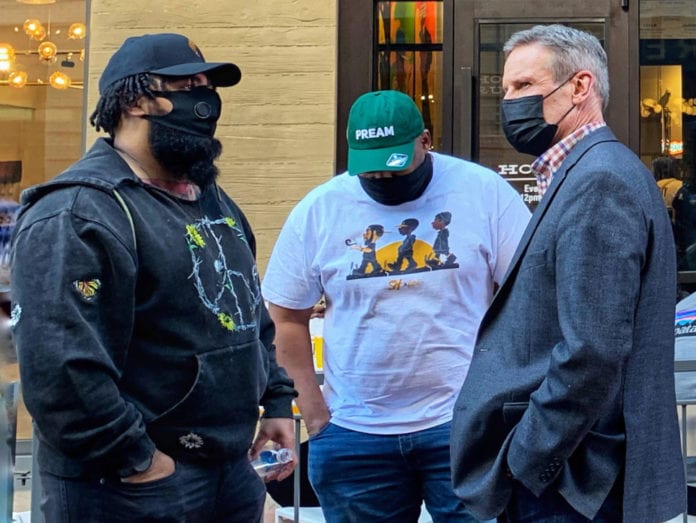Shelby County’s stumbles with vaccine distribution, Tennessee’s pandemic recovery and the state’s plan for improving African-American health disparities exposed during the ongoing public health emergency punctuated Gov. Bill Lee’s exchange with the Tennessee Press Association this week.
Lee has committed $200 million to counties and municipalities for pandemic relief expenditures and is pushing for another $200 million for broadband expansion in every Tennessee community.
The investments – intended to offset impacts of COVID-19 – are part of the state’s $41.8 billion Fiscal Year 2022 budget.
As of March 2, 1.4 million Tennesseans have been vaccinated, reducing the numbers of infections and hospitalization across the state. More than 70 percent of vaccines distributed have been administered.
Major metropolitan areas have lifted some restrictions and nursing homes have reopened with no visitation restrictions. All Tennessee nursing home residents have been vaccinated and shots for all long-term care residents are near completion.
“It’s been a very tragic and difficult year for many,” said Lee. “A lot of loss of life, a lot of loss of jobs – a lot of loss of income and savings, a lot of struggle and a lot of difficulty – we will not and cannot forget that. …
“What we can do is take that and use it to inspire us to move forward in powerful ways.”
Last week, Shelby County’s vaccine distribution was taken over by the Tennessee Health Department (THD) in partnership with the City of Memphis. Distribution was previously led by the Shelby County Health Department.
Alisa Haushalter, former SCHD director, resigned after reports surfaced of 2,400 wasted vaccines. Another SCHD expert retired and one was released of duty.
FBI (Federal Bureau of Investigation) and THD probes are underway.
A Center for Disease Control & Prevention team arrived in Memphis Tuesday to assist THD with examining record keeping issues and misinformation.
“There were “too many mistakes, too many failures in protocol and process,” Lee said.
According to THD, Shelby County’s vaccine distribution is now running more smoothly.
Minority health disparities uncovered
The New Tri-State Defender asked Lee about the state’s strategy for improving African American health disparities exposed during the pandemic.
Lee pointed to Tennessee’s Office of Minority Health and Disparities Elimination – the department developed exclusively to address minority health inequities.
Dr. Kimberly Lamar has headed the office since April 2020 and reports to Lee weekly on minority vaccination approaches used across the state.
Hamilton and Shelby counties, both with large Black populations, have been among areas reporting the lowest minority vaccination data.
In mid-February, Blacks in Hamilton County received only 11 percent of available vaccinations from providers. However, its black population is about 25 percent, a disparity county leaders recognized and pledged to improve.
In Shelby County, the goal is to vaccinate 650,000 citizens by August or 70 percent of the population.
Memphis, which is 60 to 65 percent Black, makes up most of the county.
As of March 2, Shelby County records indicate – of 152,507 vaccines administered – 28.4 percent were black citizens and 44.9 percent were white – a sizeable difference. Vaccine recipients voluntarily report race data – 11.6 percent reported no race or ethnicity.
“We recognize and understand that access to healthcare is more challenging for that (African American) population – vaccine hesitancy is greater and justifiably so because of history with that population,” said Lee.
For many African Americans, vaccine hesitancy emerged following the Tuskegee Experiment between 1932 and 1972. The study involved 600 Black men – 399 with syphilis, 201 without – who were misled about its purpose and never given proper treatment.
The Office of Minority Health mainly uses federally qualified health centers and the black church, “an important part of that community,” to distribute vaccines “mostly because it’s a trusted voice,” said Lee.
“People want to hear – not from the government – but from somebody they trust if they don’t trust the government.”
“They want to hear about information on the vaccine or testing, or how to access the services we have.”
A dashboard of Tennessee’s COVID-19 cases through February 5 shows 1,777 Blacks died of the virus (17.1 percent of virus deaths) and 4,274 blacks were hospitalized (24.3 percent of virus hospitalizations). Healthcare providers report data; patients self-identify race.
Lee said Tennessee exceeds the national average percentage of vaccines distributed to African American and Latino citizens, “but we’re not as good as we want to be.”
“We will continue to focus and – actually this week – we have multiple events across the state targeting ethic and minority populations with regard to vaccination.”




